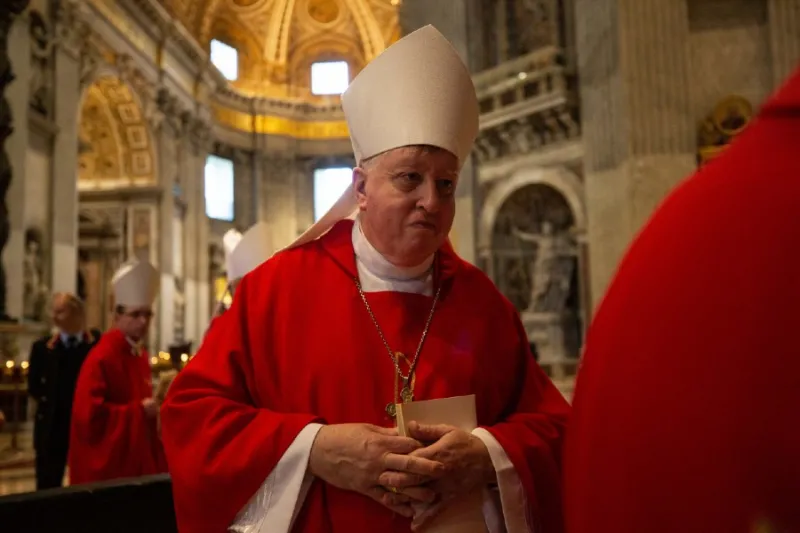.jpg?w=800) The lethal injection room at California’s San Quentin State Prison. / California Department of Corrections via Wikimedia (CC BY 2.0)
The lethal injection room at California’s San Quentin State Prison. / California Department of Corrections via Wikimedia (CC BY 2.0)
Washington D.C., Jul 21, 2021 / 18:02 pm (CNA).
One recent survey shows a majority of U.S. Catholics supporting use of the death penalty for murder convicts. The poll numbers follow a 2018 update to the Catechism that the death penalty is “inadmissible.”
According to a survey of 5,109 U.S. adults by the Pew Research Center, conducted from April 5 to 11, 2021 and published in June, a majority of U.S. Catholics either “strongly” or “somewhat” support use of the death penalty for murder convicts.
Mirroring the responses of U.S. adults overall, 31% of Catholics “somewhat” favor the death penalty for those convicted of murder, while 27% of Catholics “strongly” favor it.
In comparison, 32% of U.S. adults “somewhat” favor the death penalty in such cases, and 27% “strongly” favor it, according to the Pew report.
Among Hispanic Catholics, there is slightly more support for the death penalty for murder convicts. In this subgroup, 30% “somewhat” support the death penalty in such cases, and 31% “strongly” support it.
Regarding the question of moral justification for the death penalty, a majority of Catholics believe it is justified in cases of murder convictions.
Among Catholics overall, 60% say capital punishment is morally justified “when someone commits a crime like murder”; among Hispanic Catholics, that number is 62%. Only 30% of Catholics believe the death penalty is morally wrong, including 35% of Hispanic Catholics.
Among religious subgroups, white evangelical and non-evangelical Protestants are most likely to believe the death penalty is morally justified in cases such as murder. More than three-quarters, 77%, of white evangelical Protestants believe this, and 76% of white non-evangelical Protestants.
Nearly two-thirds of those professing no religion “in particular,” 66%, also said that capital punishment is justified in such instances.
Language in the Catechism of the Catholic Church on the use of the death penalty was updated in 2018, calling it “inadmissible.”
Pope Francis, in his 2020 encyclical Fratelli Tutti, wrote, “Today we state clearly that ‘the death penalty is inadmissible’ and the Church is firmly committed to calling for its abolition worldwide.”
In October 2020, CNA spoke with Fr. Thomas Petri regarding Pope Francis’ statements on the death penalty. Fr. Petri is currently the president and assistant professor of moral theology and pastoral studies at the Pontifical Faculty of the Immaculate Conception at the Dominican House of Studies.
He explained that the Church’s ordinary magisterium has always taught that “states have the right to inflict the penalty of death.” He added that “no pope can somehow come out and contradict that.”
Pope Francis, he said, did not say the use of the death penalty was “intrinsically evil,” and thus did not contradict the Church’s ordinary magisterium.
Both popes John Paul II and Francis have made prudential applications of the Church’s teaching in areas of faith and morals, he said. Their statements on the death penalty have noted that the security of modern prisons has rendered the need for the death penalty non-existent, as a means of protecting society from criminals.
Thus, since popes have spoken frequently on the death penalty in recent years – including through encyclicals and the Catechism – Catholics cannot just prudentially disagree with their teachings, he said.
“You can probably disagree with whether or not there should be life prison terms, but not this. I don’t think you can say this about the death penalty issue,” he said.
According to a 2020 RealClear Opinion Research poll, sponsored by EWTN News, U.S. Catholics broadly supported the death penalty by a margin of 57% to 29%.
In the April 2021 Pew survey, atheists, agnostics, and Black Protestants were the most likely religious subgroups to say the death penalty is morally wrong. A slight majority of atheists, 51%, believe the death penalty is morally wrong, compared to 47% of self-identified agnostics and 42% of Black Protestants.

[…]




.jpg?w=800)